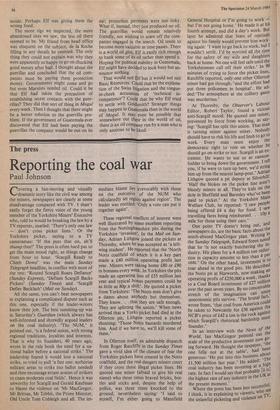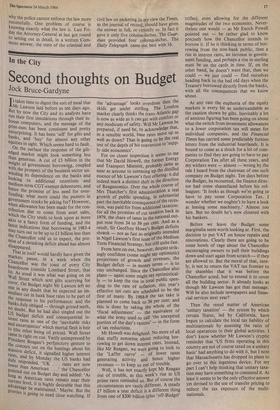The press
Reporting the coal war
Paul Johnson
Covering a fast-moving and visually dramatic story like the civil war among the miners, newspapers are clearly at some disadvantage compared with TV. I shan't easily forget the fierce voice of the young member of the Yorkshire Miners' Executive who, told he would be breaking the law by a TV reporter, snarled: 'There's only one law — don't cross picket lines.' Or the Yorkshire picket, saying to a TV cameraman: 'If tha puts that on, ah'll thump thee!' The press is often hard put to get the main mood right, as things change from hour to hour. `Scargill Ready to Climb Down' was the main Sunday Telegraph headline, in conflict with most of the rest: 'Routed Scargill Roars Defiance' (Sunday Express), 'Defiant Scargill Backs Pickets' (Sunday Times) and `Scargill Defies Backlash' (Mail on Sunday).
All the same, you can't beat newspapers in explaining a complicated dispute such as this one, especially if the leader-writers know their job. The best summing-up was in Saturday's Guardian (which always has well-informed and shrewdly argued leaders on the coal industry). 'The NUM,' it pointed out, 'is a federal union, with strong regional traditions, loyalties and interests. That is why its founders, 40 years ago, wrote in the rule book the need for a na- tional ballot before a national strike.' The leadership feared it would lose a national strike, so tried to pull 'a fast one: authorise militant areas to strike (no ballot needed) and then encourage errant armies of strikers to roam moderate coal fields'. Hence it was unworthy for Scargill and Gerald Kaufman to blame the violence on `Mr MacGregor, Mr Brittan, Mr Tebbit, the Prime Minister, Old Uncle Tom Cobleigh and all. The im-
mediate blame lies irrevocably with those on the executive of the NUM who calculatedly set region against region'. The leader was entitled: 'Only a vote can put it together again'.
These regional conflicts of interest were well illustrated by some excellent reporting from the Nottinghamshire pits during the Yorkshire 'invasion'. In the Mail on Sun- day, Adrian Lithgow joined the pickets at Thoresby, where he was accepted as 'a left- wing student'. He reported that the 'North Notts coalfield of which it is a key part made a £40 million operating profit last year. Miners were taking home £80 or £90 in bonuses every week. In Yorkshire the pits made an operating loss of £55 million last year and typical bonus payments could be as little as 80p a shift'. He quoted a picket from Yorkshire: 'The Notts men don't give a damn about anybody but themselves. They know. . . that they are safe enough. They are splitting the union.' When news arrived that a Yorks picket had died at the 011erton pit, Lithgow reported a picket shouting: 'Those Notts bastards murdered him. And if we have to, we'll kill some of them.'
In 011erton itself, an admirable dispatch from Roger Ratcliffe in the Sunday Times gave a vivid idea of the climate of fear the Yorkshire pickets have created in the Notts coalfield, and the real dangers miners court if they cross these illegal picket lines. He quoted one miner (afraid to give his real name) who three times braved bricks, bot- tles and sticks and, despite the help of police, was three times knocked to the ground, nevertheless saying: 'I said to myself, I'm either going to Mansfield General Hospital or I'm going to work but I'm not going home.' He made it at his fourth attempt, and did a day's work. But later he admitted that fears of reprisals against his family would prevent him work- ing again: 'I want to go back to work, but I wouldn't settle. I'd be worried all the time for the safety of my wife and daughters back at home. No one will feel safe until the Yorkshiremen call off their strike.' In 90 minutes of trying to force the picket lines, Ratcliffe reported, only one other 011erton miner had got through, 'and the effort had put three policemen in hospital'. He ad- ded:`The atmosphere at the colliery gates was murderous.'
At Thoresby, the Observer's Labour Editor, Robert Taylor, found a vicious anti-Scargill mood. He quoted one miner, prevented by force from working, as say- ing: `Scargill has split this union. That man is turning miner against miner. Nobody should have to risk his life and limb to go to work. Every man must enjoy the democratic right to vote on whether he should go on strike or not. Scargill is an ex- tremist. He wants to use us as cannon- fodder to bring down the government. I tell you, if he were to turn up here, we'd string him up from the nearest lamp-post.' Adrian Lithgow quoted a pit deputy at Silverhill: `Half the blokes on the picket line aren't bloody miners at all. They're kids on the dole in Sheffield and Barnsley who've been paid to picket.' At the Yorkshire Main Welfare Club, he reported: 'I saw people being offered £4 a day for food. I saw travelling fares being reimbursed. . .10p a mile for those using their cars.' One point TV doesn't bring out, and newspapers do, are the basic facts about the much-abused MacGregor plan. Writing M the Sunday Telegraph, Edward Steen noted that he 'is not exactly butchering the in- dustry. His plans for a 4 million ton reduc- tion in capacity amount to less than 4 per
i cent.' On the other hand, investment s to
roar ahead in the good pits. He described the Notts pit at Harworth, now making an operating profit of £250,000 a week, thanks to a Coal Board investment of £27 million over the past seven years. By no conceivable stretch of the imagination can some uneconomic pits survive. 'The brutal fact, wrote Steen, 'that coal from America could be taken to Newcastle for £36 against the NCB's price of £42 a ton is the rock against which Scargill's rhetorical battleship must founder.' In an interview with the News of the World, Ian MacGregor pointed out the scale of the productive investment now,thego- ing forward. He thought the taxpayer,
one fella not at the table', had been generous: 'He put into this business about £1,500 million last year.' He added:Thie coal industry has been investing at a high rate. In fact I would say that probably [it the highest rate of any industry in the UK at the present moment.' Where the press has been less successful, I think, is in explaining to viewers, who see the unlawful picketing and violence on Tv why the police cannot enforce the law more successfully. One problem of course is knowing exactly what the law is. Last Fri- day the Attorney-General at last got round to setting out in detail, in a written Com- mons answer, the state of the criminal and
civil law on picketing.In my view the Times, as the journal of record, should have given the answer in full, or virtually so. In fact it gave it only five column-inches. The Guar- dian provided four column-inches. The Daily Telegraph came out best with 16.











































 Previous page
Previous page